
Introduction & Methodology
Wynton Marsalis is best known for his artistry as a jazz musician. He is one of the most notable jazz musicians of this time, drawing inspiration from those who came before him. Even though Marsalis is still alive and performing internationally, the world of academia surprisingly had little to say about the life he has lived thus far.
I was first exposed to the musical stylings of Wynton Marsalis in high school, when one day at Jazz Band rehearsal a classmate of mine played on of his songs over the speakers. I was captivated because I had never heard jazz played by a professional before. Then our Jazz Band had the opportunity to meet Wynton Marsalis before his performance with Jazz at Lincoln Center when they came for a performance at our local performing arts center.
To gather information about Wynton Marsalis, I first looked for scholarly articles either written about or written by him using the Robert Woodruff Library online Database. The results of this search consisted of a few interviews of Marsalis and reviews of some of the books he has written. Finally, I found Marsalis’ website where there was biographical information as well as information about his books, philanthropic efforts, and the many performances he has given over the years. This website serves as the primary source for the information in this paper, as a way to take a glimpse at Marsalis’ life and work as a musician, teacher, and humanitarian.
Thesis
Throughout his lifetime, Wynton Marsalis has captured the hearts, minds, and ears of audiences around the world. However, his most important work has been the emphasis he places on the importance of Jazz music in African American Culture through his talents, music, books, and philanthropic efforts.
Early Life
Wynton Marsalis was born October 18, 1961 in the Crescent City, New Orleans, Louisiana. It is almost prophetic that a jazz musician of this caliber would be born in the non other than the birthplace of Jazz music (Monson 165). Taking to music–particularly trumpet–at an early age, Marsalis had his first public performance at the age of 8. He performed in the Fairview Baptist Church Band with notable banjo player, Danny Barker. A few years later, at the age of 14, he performed with the New Orleans Philharmonic. In the later stages of his teenage years, Marsalis performed with a variety of Jazz and Concert bands even performing a few times with a local funk band. At 17, he became the youngest musician to be admitted Tanglewood’s Berkshire Music Center and at 18 he moved to New York City to attend Julliard.
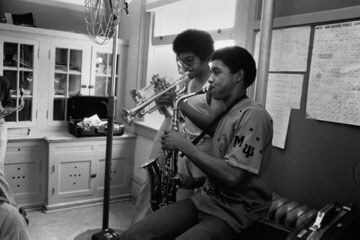
After performing small gigs around the city, Columbia Records scrambled to sign Marsalis to their label. He joined the band Jazz Messengers and had the opportunity to perform with the greats: Dizzy Gillespie, John Lewis, and Herbie Hancock to name a few. People often referred to Marsalis as being “…immensely talented as well as articulately outspoken about ‘real’ jazz, representing a far more politically acceptable return to the musical and sartorial styles of the 1950s and 1960s…” (Farley 2011). Even though Marsalis was still young, he took to the road with his own band in 1981 (Marsalis). For the next decade they performed across the country also giving Jazz workshops. Through his performances in his own band, he paid homage to Jazz legends that influenced him—-Charles Mingus, John Coltrane, Ornette Coleman, and Miles Davis (Elie 1990)–and paved a way for newer Jazz musicians to come after him.
An Eventful Career
As a well-rounded musician, Wynton Marsalis did not limit himself to jazz. He explored performances in other genres, most notably in classical music. He recorded several classical concertos when he was only in his 20s and his very first classical record won a Grammy Award (Grammy Awards). Marsalis performed with the New York Philharmonic, Los Angeles Philharmonic, Boston Pops, English Chamber Orchestra, and many other professional classical performance groups. His most notable classical performance was later in his life with classical soprano singer Kathleen Battle entitled “Baroque Duet” in 1992.
Holding true to his roots, Wynton Marsalis wanted to share his love for Jazz with the rest of the world. In doing so, he co-founded the jazz program at Lincoln Center in 1987 which was later renamed Jazz at Lincoln Center in 1996. Marsalis also opened Frederick P. Rose Hall, “the world’s first institution for jazz” (Marsalis). This venue would serve as the first place for jazz musicians to perform, rehearse, and record jazz music. Jazz at Lincoln Center seeks to not only entertain but also educate audiences about jazz and what it means culturally. There are programs for children in which they are taught about the technicality and cultural importance of the genre.
Philanthropy
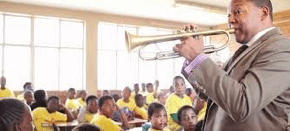
Wynton Marsalis has used his talent and knowledge of jazz to educate people about its importance. Often times relating it to troubles of society. In a 2008 interview with NBC, Marsalis stated that “Teaching young people about jazz is so much more than simply teaching them about music…jazz is really all about that: accepting what other people are doing and working with it” (Stepanek & Marsalis). Wynton Marsalis is using jazz as a way to teach people about their differences and in doing so teaching them that our differences can work together well for the common good.
Marsalis has also donated his time to several non-profit organizations. He has worked with shelters for homeless children, women who are victims of domestic violence, food banks, and even an organization that promotes the arts for those with physical and mental disabilities.
Conclusion
From his days as a musician in a church band to performing for thousands across the globe, Wynton Marsalis has always kept the “why” at the forefront of his work. He has used his talents, time, and resources to give back in a unique way: education and advocacy. Marsalis opened Jazz at Lincoln Center, performed for several non-profit organizations, and has given several talks about Jazz music to spread the word on how it has shaped and impacted our everyday life. Marsalis is always sure to show audiences that jazz music is still very relevant to this day. For a genre that was slowly losing popularity, Marsalis helped to bring it back. Wynton Marsalis did not just show people jazz, he let them experience it. Marsalis was able to strip away the theatrics of the performance. He took the audience back to the days where it was just a boy and his horn and that’s where their appreciation of jazz began; Marsalis’ mission was a success. I think we can all learn something from Mr. Marsalis; do what you love, love what you do, because in the end you may be the person to save it.
Discography
Wynton Marsalis- 1982
Haydn, Hummel, L. Mozart: Trumpet Concertos- 1983
Think of One- 1983
Wynton Marsalis Plays Handel, Purcell, Torelli, Fasch, and Molter- 1984
Hot House Flowers- 1984
Black Codes from the Underground- 1985
Tomasi, Jolivet: Tumpet Concertos- 1986
J Mood- 1986
Carnaval- 1987
Marsalis Standard Time, Vol. 1- 1987
Live at Blues Alley- 1988
Baroque Music for Trumpets- 1988
Blues and Swing- 1988
Portrait of Wynton Marsalis- 1988
Works by Husa, Copland, Vaughan Williams, and Hindemith- 1989
The Majesty of The Blues- 1989
Crescent City Christmas Card- 1989
The Resolution of Romance-Standard Time, Vol. 3- 1990
Tune in Tomorrow- 1990
Haydn: Three Favorite Concertos- 1990
Intimacy Calling-Standard Time, Vol. 2- 1991
Thick in the South (Soul Gestures in Southern Blue, Vol.1)- 1991
Uptown Ruler (Soul Gestures in Southern Blue, Vol.2)- 1991
Levee Low Moan (Soul Gestures in Southern Blue, Vol.3)- 1991
Baroque Duet- 1992
Blue Interlude-1992
Portraits by Ellington- 1992
A Carnegie Hall Christmas Concert- 1992
Concert for Planet Earth- 1992
Resolution to Swing- 1993
Citi Movement- 1993
On the Twentieth Century- 1993
Jazz At Lincoln Center Presents: The Fire of The Fundamentals- 1994
Accent on the Off Beat- 1994
In This House, On This Morning- 1994
They Came to Swing- 1994
The London Concert- 1994
Griot New York- 1995
Joy Cool’s Blues- 1995
Marsalis on Music- 1995
In Gabriel’s Garden- 1996
Blood on the Fields- 1997
Jump Start and Jazz-Two Ballets by Wynton Marsalis- 1997
The Midnight Blues-Standard Time, Vol. 5- 1998
Classic Wynton- 1998
Live In Swing City-Swingin’ with Duke- 1999
Marsalis Plays Monk-Standard Time, Vol.4- 1999
A Fiddler’s Tale- 1999
At the Octoroon Balls-String Quartet No.1- 1999
Big Train- 1999
Sweet Release & Ghost Story: Two More Ballets by Wynton Marsalis- 1999
Mr. Jelly Lord-Standard Time Vol.6- 1999
Listen to the Storytellers: A Trio of Musical Tales From Around The World- 1999
Reeltime- 1999
Live at the Village Vanguard- 19999
Selections From the Village Vanguard Box- 2000
The Marciac Suite- 2000
Popular Songs: The Best of Wynton Marsalis- 2001
All Rise- 2002
The Marsalis Family-A Jazz Celebration- 2003
Lincoln Center Jazz Orchestra with Wynton Marsalis plays the music of Duke Ellington- 2004
The Magic Hour- 2004
Cast of Cats- 2004
Unforgivable Blackness-The Rise and Fall of Jack Johnson- 2004
A Love Supreme- 2005
Live at the House of Tribes- 2005
Don’t Be Afraid: The Music of Charles Mingus- 2005
iTunes Live Session- 2006
Master Class Jazz-Wynton Marsalis- 2006
Master Class Trumpet-Wynton Marsalis- 2006
In this House, On this Morning (DVD)- 2006
Here…Now- 2007
From the Plantation to the Penitentiary- 2007
The Essential Wynton Marsalis- 2007
The War-A Ken Burns Film- 2007
Congo Square- 2007
Standards & Ballads- 2008
Congo Square (DVD)- 2008
The History of the Trumpet-Wynton Marsalis- 2008
Willie Nelson & Wynton Marsalis: Live from Jazz at Lincoln Center, NYC- 2008
Willie Nelson & Wynton Marsalis: Two Men With the Blues- 2008
He And She- 2009
Christmas Jazz Jam- 2009
Portrait in Seven Shades- 2010
From Billie Holiday to Edith Piaf- 2010
Music Redeems- 2010
Vitoria Suite- 2010
Here We Go Again: Celebrating the Genius of Ray Charles- 2011
Wynton Marsalis & Eric Clapton Play The Blues- 2011
Swingin’ Into the 21st BOX SET- 2011
Selections From Swinging Into The 21st- 2011
The Music of America: Wynton Marsalis- 2012
The Spiritual Side of Wynton Marsalis- 2013
Live in Cuba- 2015
Big Band Holidays- 2015
The Abyssinian Mass- 2016
The Music of John Lewis- 2017
All Jazz is Modern: 30 Years of Jazz at Lincoln Center, Vol. 1- 2017
Handful of Keys- 2017
United We Swing: Best of The Jazz at Lincoln Center Galas- 2018
Bibliography
Biography-Wynton Marsalis. Retrieved from http://wyntonmarsalis.org/about/bio
Elie, L. (1990). An Interview with Wynton Marsalis. Callaloo, 13(2), 271-290. doi:10.2307/2931700
FARLEY, J. (2011). Jazz as a Black American Art Form: Definitions of the Jazz Preservation Act. Journal of American Studies, 45(1), 113-129. Retrieved from http://www.jstor.org/stable/23016762
Monson, I. (2015) Jazz. In Burnim, M. V. & Maultsby, P. K. (Eds.), African American Music: An Introduction (pp. 163-188). New York, NY: Routledge.
Recording Academy (2018) Wynton Marsalis. Retrieved from https://www.grammy.com/grammys/artists/wynton-marsalis
Stepanek, M. (Interviewer) & Marsalis, W. (Interviewee). (2008). For Wynton Marsalis ‘The cause is the People’ [Interview transcript]. Retrieved from NBC website: http://www.nbcnews.com/id/25644088/ns/us_news-giving/t/wynton-marsalis-cause-people/#.Wu38d9Mvw0Q
Powerpoint Presentation
Parting Thoughts
Dr. Johnson, I’ll admit I thought I knew exactly what to expect from this class. However, after the first week of class I was quickly
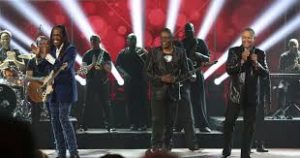
Earth, Wind and Fire/Chicago: Different Bands, Different Sounds, Same Audience?
[embedyt] https://www.youtube.com/watch?v=XzFPG4UtVko[/embedyt] In 2004, funk band Earth, Wind, and Fire and rock band Chicago joined one another on a joint tour. Their performance at the
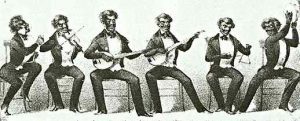
Minstrel Shows- Musical Theatre
How did the minstrel show develop? Describe its form, major characters, and musical content. When and why did African Americans become minstrels? In what seminal
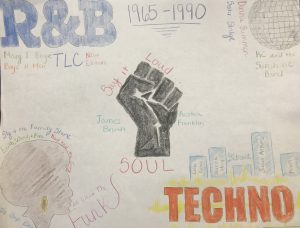
Music Through the Ages: 1965-1990
The genre name Rhythm and Blues, R&B, replaced the term race records in 1949. These R&B songs first emerged during World War II and the
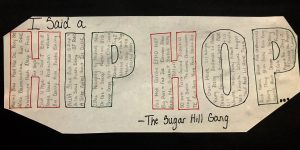
“I Said A Hip Hop”- From Basements to Billboard
Hip Hop music, like many genres, began as something that was uniquely Black. It was yet another way for African Americans to express themselves. Originating

The Revolution Will Not Be Jazz-ified
Jazz music has persisted and been an integral part in African American culture for almost a century. Jazz music has its root in the years

